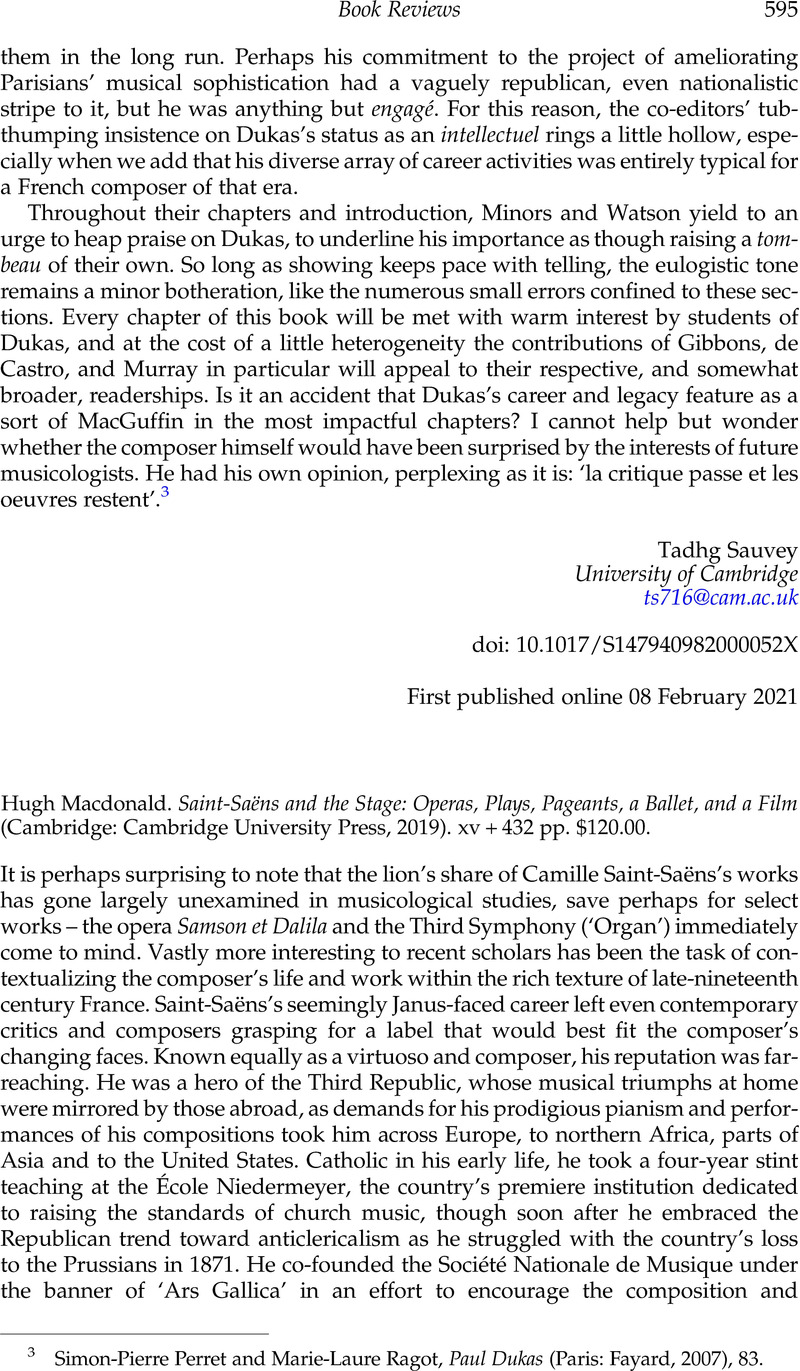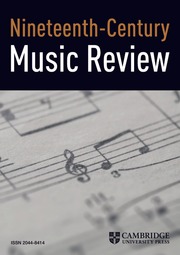No CrossRef data available.
Article contents
Hugh Macdonald. Saint-Saëns and the Stage: Operas, Plays, Pageants, a Ballet, and a Film (Cambridge: Cambridge University Press, 2019). xv + 432 pp. $120.00.
Review products
Published online by Cambridge University Press: 08 February 2021
Abstract

- Type
- Book Review
- Information
- Copyright
- Copyright © The Author(s), 2021. Published by Cambridge University Press
References
1 Jann Pasler and Sabina Teller Ratner, ‘Camille Saint-Saëns’, Oxford Bibliographies Online.
2 Exceptions are Pasler, Jann, ed. Camille Saint-Saëns and His World (Princeton: Princeton University Press, 2012)Google Scholar, Stegemann, Michael, ed. The Many Faces of Camille Saint-Saëns (Turnhout: Brepols, 2018)Google Scholar, and Ratner, Sabina Teller, Camille Saint-Saëns, 1835–1921: A Thematic Catalogue of his Complete Works, 2 vols (Oxford: Oxford University Press, 2012)Google Scholar.
3 Macdonald also includes the number given to each work by Ratner in her thematic catalogue, thereby simplifying the process of cross-referencing.
4 See, for example, Grayson, David, ‘Finding a Stage for French Opera’, in Music, Theater, and Cultural Transfer: Paris, 1830–1914, ed. Everist, Mark and Fauser, Annegret (Chicago: University of Chicago Press, 2009): 127–54Google Scholar. For a specific example, see also Walker, Jennifer, ‘Church, State, and an Operatic Outlaw: Jules Massenet's Hérodiade’, Cambridge Opera Journal 31/2–3 (2019): 1–26CrossRefGoogle Scholar.
5 Here I follow Mark Everist's observation that ‘views of canonic status are contingent on historical circumstance, which in turn demands systematic analysis’. See Everist, , ‘Reception Theories, Canonic Discourses, and Musical Value’, in Rethinking Music, ed. Cook, Nicholas and Everist, Mark (Oxford: Oxford University Press, 1999): 396Google Scholar.
6 On exoticism in music, see Locke, Ralph P., Musical Exoticism: Images and Reflections (Cambridge: Cambridge University Press, 2009)Google Scholar and Music and the Exotic from the Renaissance to Mozart (Cambridge: Cambridge University Press, 2015). On musical exoticism in the French context, see Fauser, Annegret, Musical Encounters at the 1889 Paris World's Fair (Rochester: University of Rochester Press, 2005), especially pages 139–241Google Scholar. On La Princesse jaune specifically, see Emma Kavanagh, ‘Du Paradis Rêvé: The Orient in the Male Imagination in Saint-Saëns's La Princesse jaune’, in The East, The West, The In-Between (Munich: Allitera, forthcoming).
7 The same critique applies to Macdonald's discussion of Lola, a scène dramatique with text by Stéphane Bordèse and music by Saint-Saëns. The eponymous character is a Spanish gypsy and comparable to Carmen, but there is no discussion of the relationship of the French to Spanish culture, real or imagined. See Llano, Samuel, Whose Spain? Negotiating ‘Spanish Music’ in Paris, 1908–1929 (New York: Oxford University Press, 2013)Google Scholar.
8 On the significance of Classical Rome and Greece to the French Republic, and particularly in the context of performances en plein air, see Ellis, Katharine, ‘Mireille's Homecoming? Gounod, Mistral, and the Midi’, Journal of the American Musicological Society 65/2 (2012): 463–509CrossRefGoogle Scholar. See also Rowell, Diana, Paris: The ‘New Rome’ of Napoleon I (London: Bloomsbury, 2012)Google Scholar and Fauser, Annegret, ‘Gendering the Nations: Ideologies of French Discourse on Music’, in The Politics of Musical Identity: Selected Essays (Aldershot: Ashgate, 2015), 71–102Google Scholar. On gender in France at the turn of the century, see McMillan, James, France and Women, 1789–1914: Gender, Society, and Politics (London: Routledge, 2000)Google Scholar and Offen, Karen, Debating the Woman Question in the French Third Republic (Cambridge: Cambridge University Press, 2017)Google Scholar.





